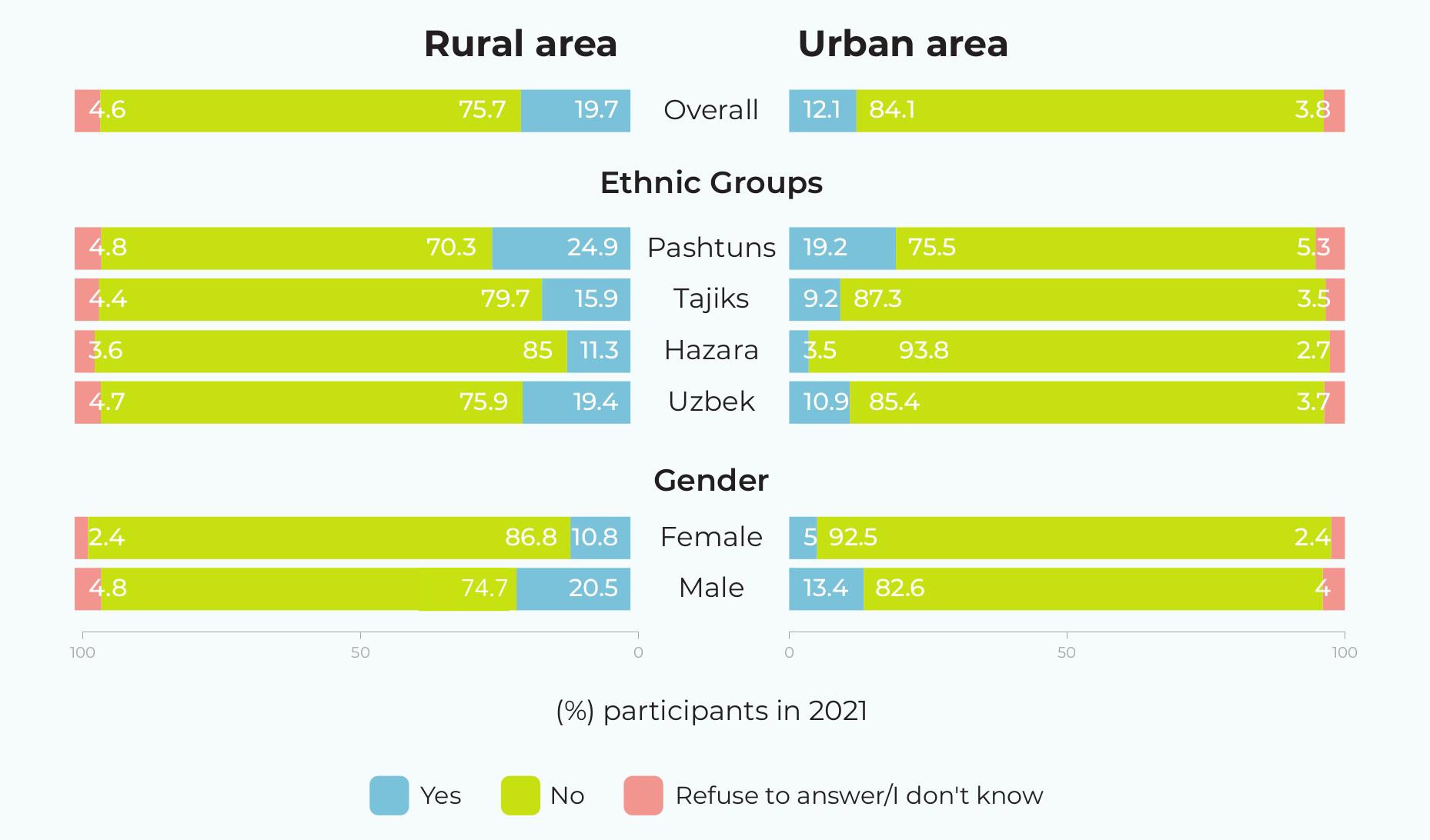The latest survey conducted by the Kabul based Organization for Social Research and Analysis (OSRA) has found that the majority of both urban and rural Afghans reject Taliban rule despite differences in socio-political norms and values.
The survey, which was conducted in 2020 and 2021, and concluded 4 months before the Taliban takeover, found that only 6.4% of rural and urban Afghans supported the Taliban in 2021, while 77.9% of the population continued to reject Taliban style of governance, particularly in regard to their infamous moral policing known as Amr-bil-Maroof which Afghans knew from their previous regime.
The Taliban reestablished the Amr-bil-Maroof authority and disbanded the Afghan Ministry of Women’s Affairs (MoWA) shortly after taking power in August 2021 . The Amr-bil-Maroof authority renamed and inhabited the MoWA building. According to the most recent reports, moral policing of the local populace is still the Taliban’s signature and key feature. Common practices include: forcing men to wear beards; prohibiting music; prohibiting and restricting women from traveling without male guardian, from recreational activities, from women-only public baths; imposing Talibani interpretations of hijab to replace the commonly worn head-cover in Afghanistan; and pushing women further away from public life through new regulations.
Are you in favor of Taliban moral police or Amr-bil-Maroof in the event of peace-agreement with the Taliban?

On women’s issues, 81.3% of Afghans (both rural and urban) supported expanding and preserving Afghan women’s role and presence in the country’s politics in 2021, 79.8% supported their presence and role in the security forces in 2021, 80.1% in the Afghan judicial system in 2021, and 77.2% supported women’s presence and role in the country’s media in 2021. Furthermore, 67.5% of Afghans stated their desire for an increase or preservation of critical media in Afghanistan in 2021. Rural Afghans appeared to be slightly more supportive of the critical press than urban Afghans. The CEO of OSRA, Maryam Baryalay, stated that:
“The data results indicate that as the Taliban continue to impose its interpretation of Sharia law deviating from mainstream interpretation in Afghanistan and lacking any legal means of popular representation within the mosaic that is Afghanistan, the group is bound to face great challenges; incentivizing military and political resistance.”
What do you think about the role and presence of women in politics in the event of a peace-agreement with the Taliban ?

Meanwhile today, Afghan girls remain largely deprived of formal education and women have been increasingly pushed out of social and political life by new rules and regulations announced by the notorious Amr-bil-Maroof authority. Similarly, press freedom in Afghanistan, which ranked fourth among south and central Asian nations in the World Press Freedom Index in 2020 has become a shell of its former self.
The research found that for an overwhelming number of issues, the urban and rural divide among Afghans across different provinces did not exceed 10%.This is largely attributed to advancement in the telecommunication sector, increased connectivity, and uncensored internet pushed by NATO countries during the last 20 years. With almost more than half of the country (22.7 million) connected to the telecommunication grid, the flow of information and content bridged the gap between rural and urban Afghanistan in unprecedented ways.
The data further showed an increased trend among Afghans to accommodate Taliban demands such as a compromise-government solution and full integration of Taliban fighters within the ranks of the former security establishment. Concurrently, people’s responses drew a redline showing that Afghans were keen on expanding or preserving the hard-earned liberties and rights of the last 20 years including those of Afghan women.
The survey, conducted in 2020 and 2021 by OSRA aimed specifically at data-driven research in Afghanistan. Run by returned diaspora and local Afghans, the data analyst of the organization* stated that technological advancement in Afghanistan, coupled with a free and critical media, (before the Taliban takeover), and growing frustration among Afghans about systemic corruption, insecurity, and economic uncertainty had created an environment where Afghans were eager to express their opinion and even political opinions, especially with Afghan researchers. Ms. Baryalay further added:
“It is critical to conduct such surveys now in Afghanistan, after the Taliban takeover, in order to have accurate data on how, why, and what Afghans think rather than making statements about them based on anecdotes, stereotype narratives, and long-overdue preconceptions.”
For more information, visit www.osra.af
Link to the report: http://osra.af/wp-content/uploads/2022/05/Survey-of-Rural-and-Urban-People_AFG_2022-05.pdf
Media Contact
Company Name: Organization for Social Research and Analysis
Contact Person: Maryam Baryalay
Email: Send Email
City: Kabul
Country: Afghanistan
Website: http://osra.af/






